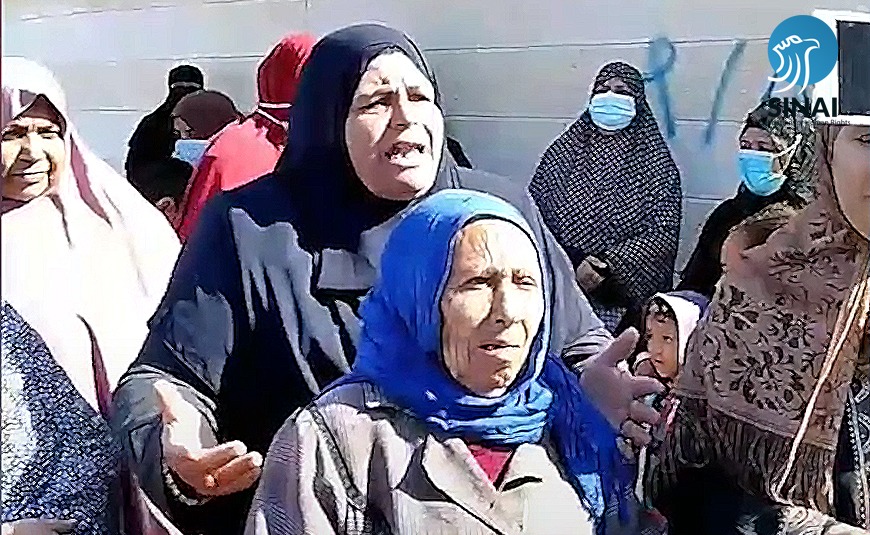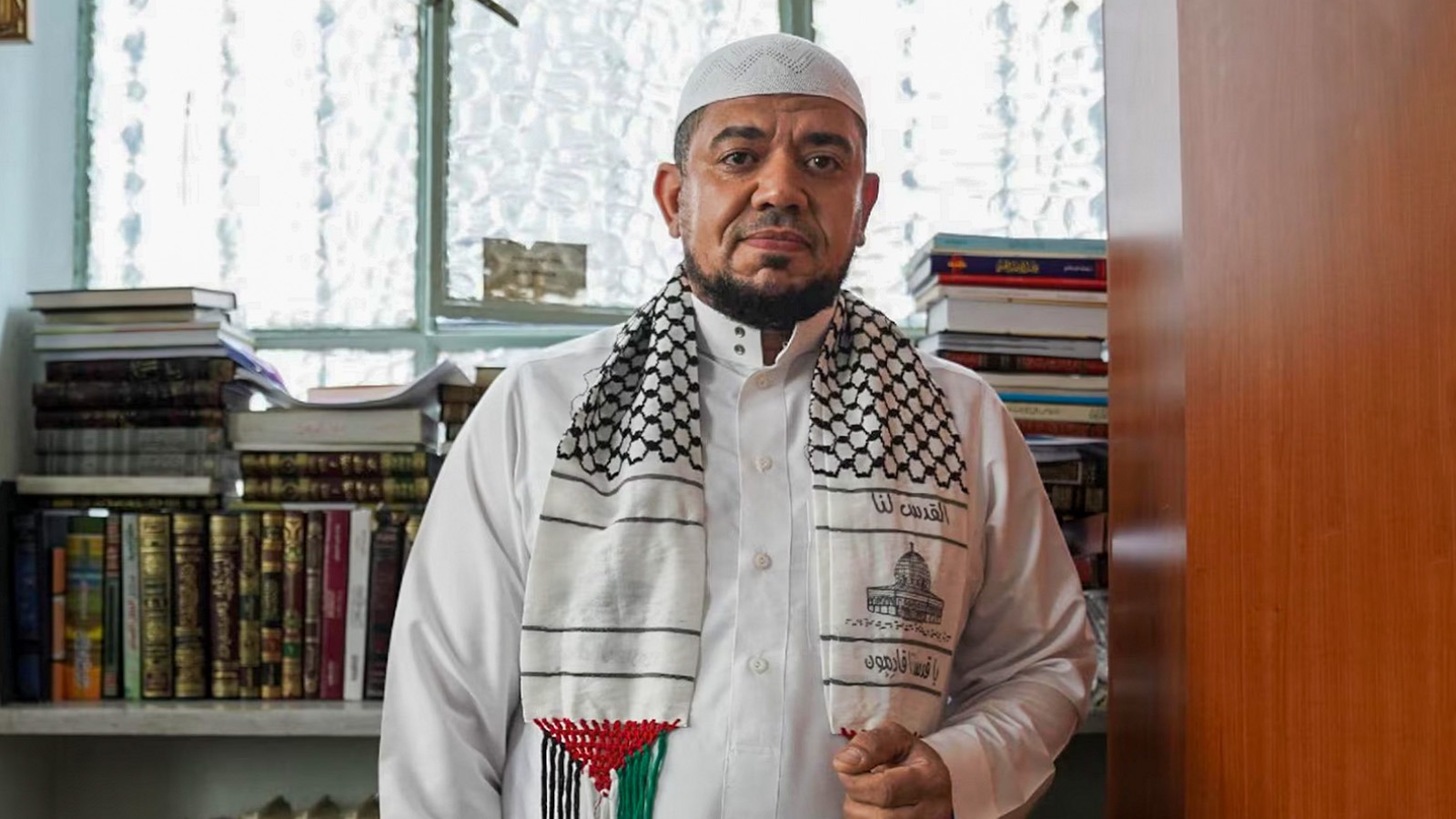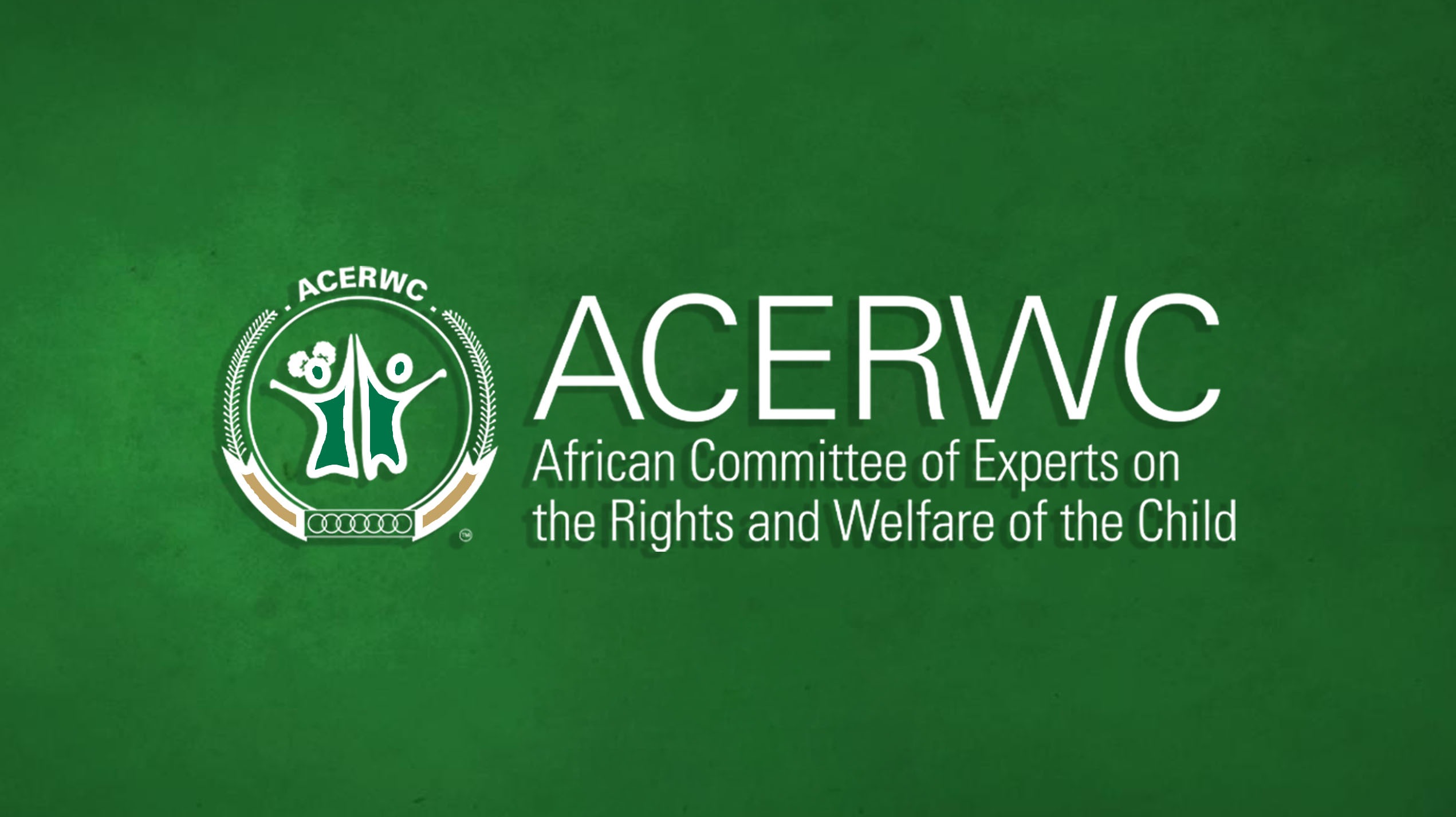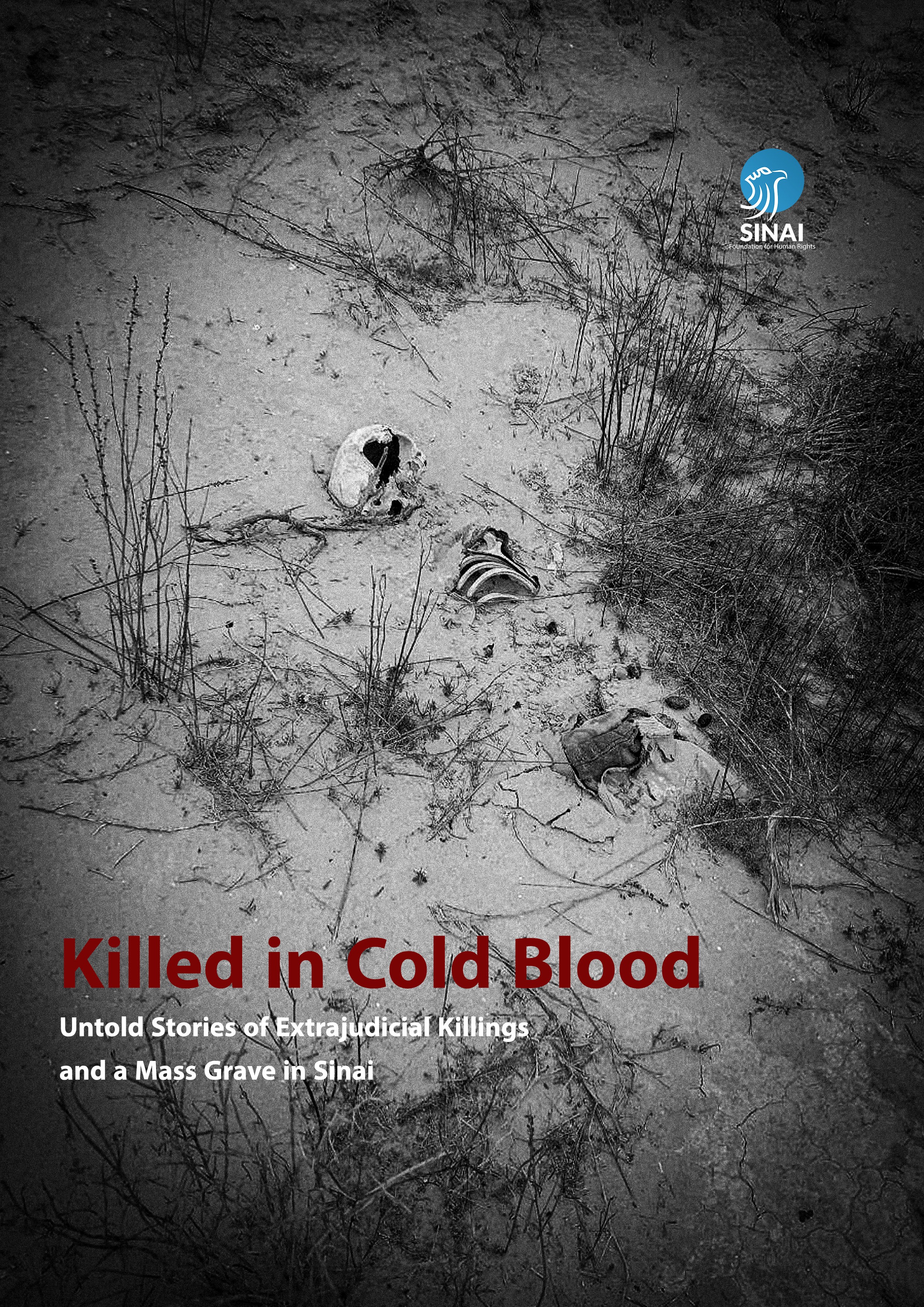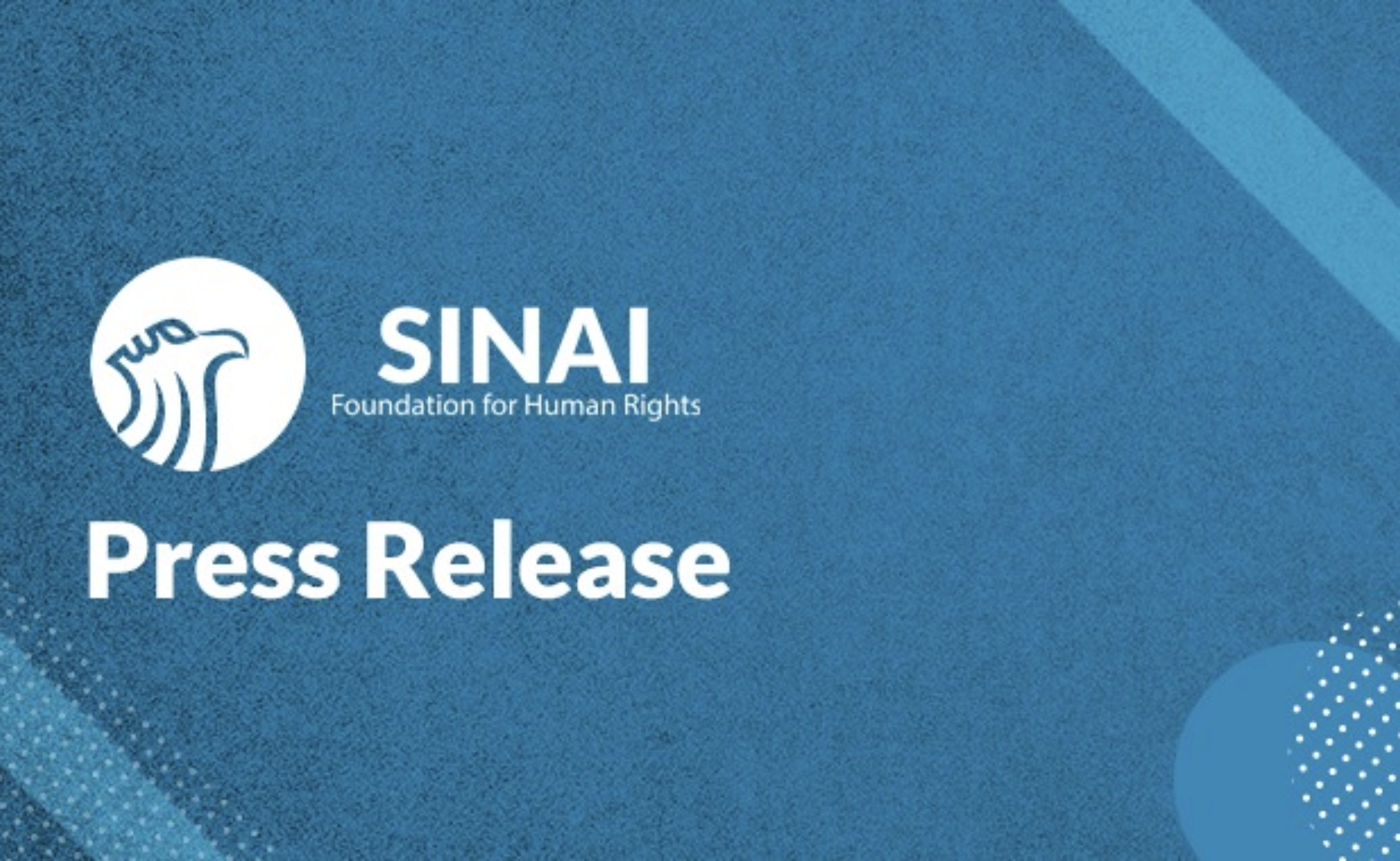“I swear we’re too scared to leave our houses after dark, fearing gunshots coming from the ambushes, so we all just stay at home with our children.. Those who go out at night are the suspicious targets, and despite that, the soldiers only see and restrict the lives of the locals..”
A local of the al-Shallaq village in al-Sheikh Zwayed talking about the security situation in the village.
Summary:
The first month of the year 2021 has gone by, heavy with 8 abuses recorded by the Sinai Foundation for Human Rights, which met with 14 eyewitnesses in close relation to the victims.
The Egyptian authorities and law-enforcement forces were responsible for two of the abuses. One of which was an incident of unlawful premeditated murder of a shepherd in al-Thahir village in al-Sheikh Zwayed where she was killed by gunfire coming from a military ambush. While the second was the eviction process and expansion of the Port of Al-Arish, which will lead to many families losing their rights and sources of income. The Sinai Foundation has published a press release, explaining the details of the situation, followed by more details, additional witness reports, and official statements.
On the other hand, the Sinai Province group is responsible for 6 abuses, as they pillaged properties and food supplies in Bir al-Abd and al-Sheikh Zwayed, in addition to the death of a civilian caused by the explosion of an explosive device planted by the group in Tofaha village while in control of the village. The group has also targeted a military vehicle, killing a man and his son, in addition to the abduction of civilians in two other incidents.
Details of the abuses:
Egyptian authorities and law enforcement forces abuses
1.Unlawful premeditated murder in the al-Thahir village in al-Sheikh Zwayed
Arbitrary deprivation of the right to life is considered to be a violation to human rights. The right to life is warranted in the Universal Declaration of Human Rights, article 3, and in article 6 of The International Covenant on Civil and Political Rights. Therefore, it is not allowed to use exceptional circumstances as an excuse to overstep those boundaries.
Killings carried out by law enforcement forces outside the state of armed conflict require the opening of an immediate investigation and bringing the accused before a judge in preparation for their prosecution and receiving a fair decision that does the victims and their families justice. Except that does not happen in Sinai. The authorities do not take those steps, instead they deliberately waste the victims’ rights by writing the incidents up as against persons unknown, which loses the victims or their families any rights proportionate with the incident, in addition to protecting those responsible from any judicial accountability.
On 15.01.2021, gunfire shot from the “Hassan” military ambush in al-Thahir village in southern al-Sheikh Zwayed led to the death of a woman called Dalal Hassan Nasr, 25 years old, who worked as a shepherd.
A local eyewitness told the foundation team during an interview:
“They shot the girl while she was shepherding a little far from the houses. I don’t know why the soldiers at the “Hassan” ambush specifically shoot the locals when they know about every movement in the village and know all the people of the village. The girl’s name is Dalal Hassan Nasr, she’s around 25 years old, unmarried. She was shot in the chest and died immediately. That day there were no clashes between the military and the Takfiris. I didn’t see any armed men in the village. This is not the first time the same ambush kills peaceful locals. The girl was transported to al-Sheikh Zwayed hospital, then to al-Arish, then the body was taken to Port-Said to the coroner’s.
2.The evacuation of the area of Port of Al-Arish and unhousing its citizens without giving alternatives or reasonable cause
Both the International Human Rights Law (applied in the case of peace) and the International Humanitarian Law (applied in the case of war) generally prohibit forced eviction and the removal of houses except in certain exceptional cases, like ensuring the citizens’ safety from environmental dangers or armed groups. The International Law only permits governments to resort to forced eviction as a last resort, in case there were no other solutions, and only within strict safeguards that guarantee proportionality, reasonability, transparency, prior discussion with the locals, and the consideration of all other solutions and alternatives. In case of the impossibility of avoiding eviction, governments are to transparently offer fair compensation before the evacuation, and the locals are to be notified a reasonable amount of time ahead of the evacuation, and to be helped find suitable replacements for their accommodation by the government. The International Law also states that land cannot be only compensated with money, but also with replacement land with similar properties that maintains the lives of the citizens, their customs and traditions to the fullest possible extent.
In the previous forced eviction operations carried out by the military in North Sinai, the armed forces did not take any of those standards into account at all. The Port region citizens are afraid of this applying to their situation as well.
In the last week of January, the problem of the expansion of the Port of Al-Arish surfaced, after the spread of reports from the locals talking about a second stage of the expansions that would affect their houses and lands that had not been announced before. The official authorities represented by Major-General Mohamed Abdel-Fadhil Shusha, the governor of North Sinai, have admitted to the existence of a new stage, but he said that it is still under consideration, he then confirmed that there are proposals to compensate the citizens at this stage, which means that there are official plans without informing the locals of their fate. This confirmation came in Major-General Mohamed Abdel-Fadhil, the governor of North Sinai’s speech on North Sinai radio on Thursday, 4 February 2021, where he explains the new proposals of expansion and those of compensations presented to political leaders.
The Sinai Foundation for Human Rights has stated in a press release published on 28.01.2021 that the Egyptian government has to immediately stop what seems to be an impending evection of thousands of families in the Port of Al-Arish area with the claim of “developing” it. The government also has to rethink their plans in this regard, and to allow a real and transparent community discussion where the citizens are heard, and available alternatives are collectively looked into before any execution. The project plans should be presented to independent specialists in the fields of maritime transport, economy, sociology, and counterterrorism to evaluate the feasibility of the project, its available alternatives, and expected consequences.
Media reports, official data, and local testimonies show that committees formed by governmental authorities have almost finished counting the houses surrounding the Port of Al-Arish area in November 2018 in preparation for their evacuation and removal of all civilian properties in the area. That was according to resolution 330 later issues by President Abdel Fattah Al-Sisi in July 2019 that transfers the ownership of all land in the port area to the Ministry of Defence.
Dr. Ahmad Salem, the Executive Director of Sinai Foundation for Human Rights stated: “The Egyptian military has been displacing tens of thousands of the citizens of Sinai and destroying their houses since 2013 with the claim of securing the area. And now they want to displace thousands with the claim of development, instead of looking into the many available alternatives and discussing them with those affected: The people of Sinai. If the aim really is to make developments for the sake of the people of Sinai like the government claims, why won’t they listen to the people at least for once?”
Al-Sisi’s resolution 330 for 2019 included a map showing that the area to be evacuated is about 371 feddans surrounding the Port of Al-Arish. Sinai Foundation for Human Rights has checked the map and coordinates attached to the resolution published in the official newspaper, issue 27 on 9 July 2019, and found that the area to be evacuated will include both residential neighborhoods and an area of coastal chalets.
Despite the presence of a map with specific coordinates in the resolution, it does not seem like the military and governmental authorities will adhere to those coordinates but will extend the eviction process outside the shown coordinates. The locals of the area of “Al-Saad Chalets” said that government officials visited their area during the past week to count and number the houses, which is a procedure for preparing for evacuation.
A local woman said in a video published on social media on 24 January: “I build my house with my own blood, sweat and tears for 25 years. How would they compensate us? Is this what we get for building Sinai up and standing behind the military?”
An affected local living in “Abou-Saqal” neighborhood told the Sinai Foundation”
“We saw a committee driving around, then two people in civilian clothes got out of the car carrying devices that turned out to be surveying equipment. That was in the area of al-Saad to the east of Abou-Saqal neighborhood, where there are legally licensed chalets owned by locals. When we talked to them, they said that they are working with the Port of Al-Arish expansion. They did not talk much or give us details. Many people said afterwards that they saw the car driving around and taking photos. We are outside the area to which they said they were expanding last year, so this was news to us. That means that any of us can one day find themselves in the street without anyone telling them what is to become of them or their children.”
We acquired another statement that showed the same amount of disapproval, where one of the affected by the surprise expansions said: “They cut off our livelihoods from fishing. I’m a fisherman and I haven’t been allowed to fish since February 2018. And now they’re kicking us out of our neighborhood. We mean nothing to the government. They will tell us next that they’ll compensate us like they did the people of Rafah, then we’d have to run around from one department to another with our documents, then only God knows if they will compensate us or if we’ll end up with nothing like the people of Rafah and al-Sheikh Zwayed. Couldn’t they find any other place in Sinai to build a large port? The entire area beyond al-Arish till al-Qantara is mostly desert by the coast. They should find a place away from where the people live. They’ll probably say next that they’re expanding for the fence, then the road, then something or another, till they take the entirety of Abou-Saqal, and we know it. It always starts this way.”
We talked to a local government official in the Maritime transport sector about his opinion on the resolution, he said:
“The most strategically feasible solution is to build a new port away from the residential areas of al-Arish. There are around 200 unutilized kilometers of coast in North Sinai, especially the areas to the west of al-Sheikh Zwayed and the west of al-Arish, which are very promising areas that can easily be connected by a network of commercial road connecting the port to the heavy industry zone in central Sinai. The establishment of a new port would also help the government avoid the costs of compensations they would have to give the affected.”
He added: “The establishment of a new port would provide a real chance of building the port according to standard criteria in terms of the operational level, storage capacity, the possibility of rearranging service locations or future expansions, which are perspectives hard to realize at the current port built on 25 April 1987 as a fishing port before the issuing of Presidential Decree 221 for 1996 to turn it into a commercial port.”
Member of the Egyptian Parliament, Rahmy Bakir, posted a statement on his Facebook profile on 26 January saying: “The government needs to reconsider the eviction of citizens, and to learn from its previous experiences with displacing civilians. There is no need to create new gaps between the republic and the citizens”, he added: “More than 4000 families will be harmed, and the officials are capable of avoiding that.”
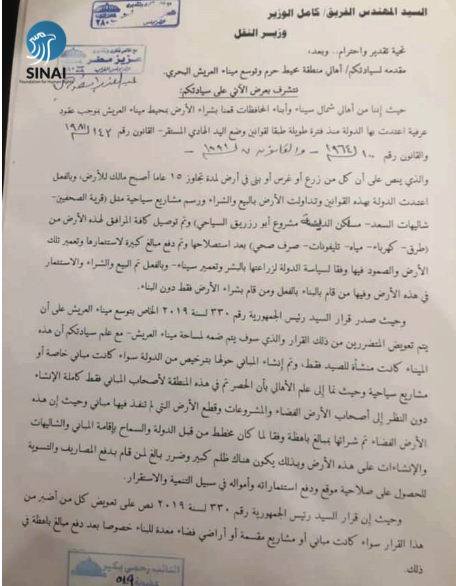
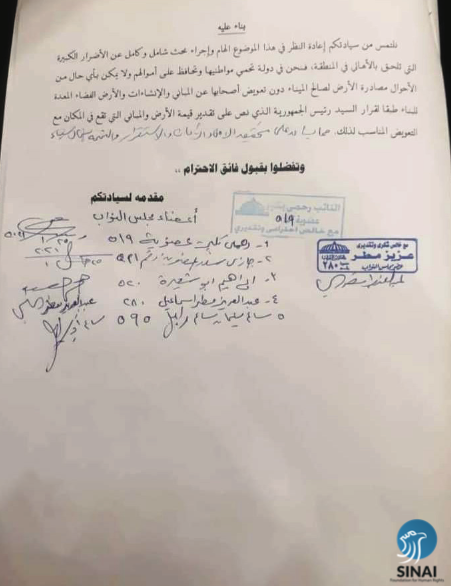
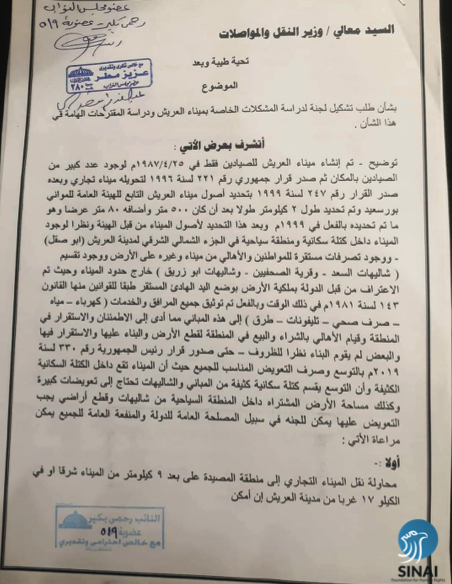
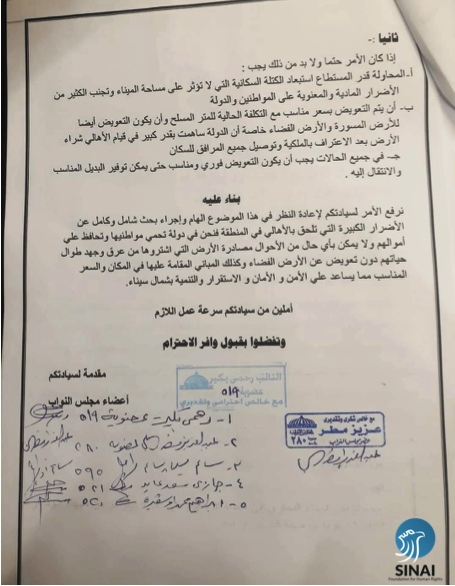
ISIS-affiliate group, Sinai Province, abuses
1.Temporary abduction of civilians and pillaging their possessions in Bir al-Abd and al-Sheikh Zwayed
Pillaging civilian properties and money and the likes is considered a crime whose perpetrator should be prosecuted. The additional protocol (II) to the Geneva Conventions, 1977 prohibits said crimes. The status of the International Criminal Court shows that pillaging is a “war crime” during international armed conflicts, and according to it: “The pillage of a town or place, even when taken by assault” is a war crime during non-international armed conflicts. The international custom and behavior, and countries that lived through a state of armed conflict show that pillaging is considered to be a crime during any armed conflict.
On 01.01.2021, armed men abducted 9 civilians from a poultry farm in al-Tlul village in Bir al-Abd, and they are:
|
Name |
Name |
|
Muhsin Mohamed Al-Said Abdul-Aal |
Farhan Shihata Farhan |
|
Khaled Abdul-Jawad Abdul-Hamid Marazy |
Mimi Yahia Mohamed Abou-Annasr |
|
Mohamed Hassan Kamhawy |
Al-Said Abdullah Al-Said Elwan |
|
Ahmed Adel Abdul-Munim |
Two unidentified persons |
Two local statements showed that the nine were abducted while armed men were pillaging more than 2000 chickens from a local poultry farm, and that those who were abducted are some of the farm workers. They were released 3 days after the abduction, as the armed men used them for transporting and unloading the poultry, then took them back to an area near al-Tlul village.
During December 2020, two incidents of pillaging of food supplies took place in al-Sheikh Zwayed, one in the eastern outskirts of al-Kawthar neighborhood at the dawn of the 21st, and the second on the 15th in al-Thahir village, where armed ISIS militants stole all food supplies from the citizens. More about that can be read in the Foundation’s last report.
On 03,01,2021, the people of al-Kawthar neighborhood in al-Sheikh Zwayed started the new year with a pillaging of food supplies by Sinai Province militants, in a manner previously reported by the Sinai Foundation for Human Rights in two previous incidents that took place in the last month of 2020, and whose details are published in their monthly report
In the details of the incident, the Sinai Province militants used the bad weather to sneak to the houses in the outskirts of the neighborhood at dawn. A government employee living in Al-Kawthar neighborhood told an investigator from the foundation:
“Before dawn, I heard knocking on a neighbor’s door, an employee as well. Then I heard low voices talking in the dialect used here. I was too scared to go out, and thank God they didn’t come to my house, but I learned from my neighbor that they took his car battery and the batteries of 3 other cars belonging to locals. I also learned that they threatened a man and his wife with guns when they tried to call out to the neighbors. The woman was shocked when she saw the weapons and was scared of getting killed. Till now her psychological state is not well and she’s still scared.”
Another local’s report revealed a new angle. He is also a government employee. He told the Sinai Foundation:
“They pillaged a supermarket owned by a member of al-Aqour family. They broke the door and took everything, then loaded the goods on a truck belonging to civilians and headed toward al-Wifaq village in Rafah. They took advantage of the fog that caused difficulty to see, so the ambushes probably didn’t see them.”
Not too far from Rafah, the people of al-Goura also had their share of pillaging by Sinai Province militants. A village local said:
“Before dawn when the fog was thick, we heard a car near the commerce school on the village’s northern road, then we heard heavy gunfire. We did not learn what happened till the next morning when we were told that the Takfiris broke down a market and took some goods, not a lot. They couldn’t take the flour that was in the provision market, which was about 5 tons, the people’s provision for the new month, because armed men working with the military saw them and shot at them, so they drove away toward Rafah. The people are scared because the village’s northern road is not well secured and it’s easy to sneak through.”
Since 2018, with the launch of the comprehensive operations in Sinai, the daily life in North Sinai has been restricted in a way that hindered the daily lives of citizens. The amounts and types of food supplies and goods that are allowed to cross into the cities or villages of the governorate have been restricted. The authorities have also mandated the prior planning with them for bringing supplies into some areas, which lead to a scarcity in food supplies in the region.
2.Indiscriminate weapons killing and injuring people in Tofaha village in Bir al-Abd
ISIS militants deliberately use random indiscriminate weapons that injure both civilians and combatants, which is a dangerous behavior that led to the death and injury of civilians. That goes against the International Humanitarian Law that obligates all parties of an armed conflict to differentiate between civilians and combatants during any conflict. This principle applies to all parties in an armed conflict and stays in effect no matter the type of conflict or the parties involved, which was emphasized by article 48 of the additional protocol (I) to the Geneva Conventions, 1977.
The Egyptian authorities in general and the armed forces in particular are supposed to completely secure the area to protect lives. They are supposed to ensure that this kind of accident does not happen again. These incidents show that the authorities have failed to fulfill their commitment to protect citizens and ensure their safe return to their respective regions. It is worth noting that the International Humanitarian Law obliges all conflicting parties controlling a territory to protect the civilians in the areas they control.
On 08.01.2021, a landmine explosion in Tofaha village led to the death of a citizen and the injury of 3 others, after the military allowed them to return to their farms after being forcibly evicted over a year prior.
The victims are:
-
Assaf Omairy Suliman, 38. (deceased)
-
Amr Mousa Omaira (injured)
-
Mohamed Saqr Omaira (injured)
-
Mohamed Ibrahim Omaira (injured)
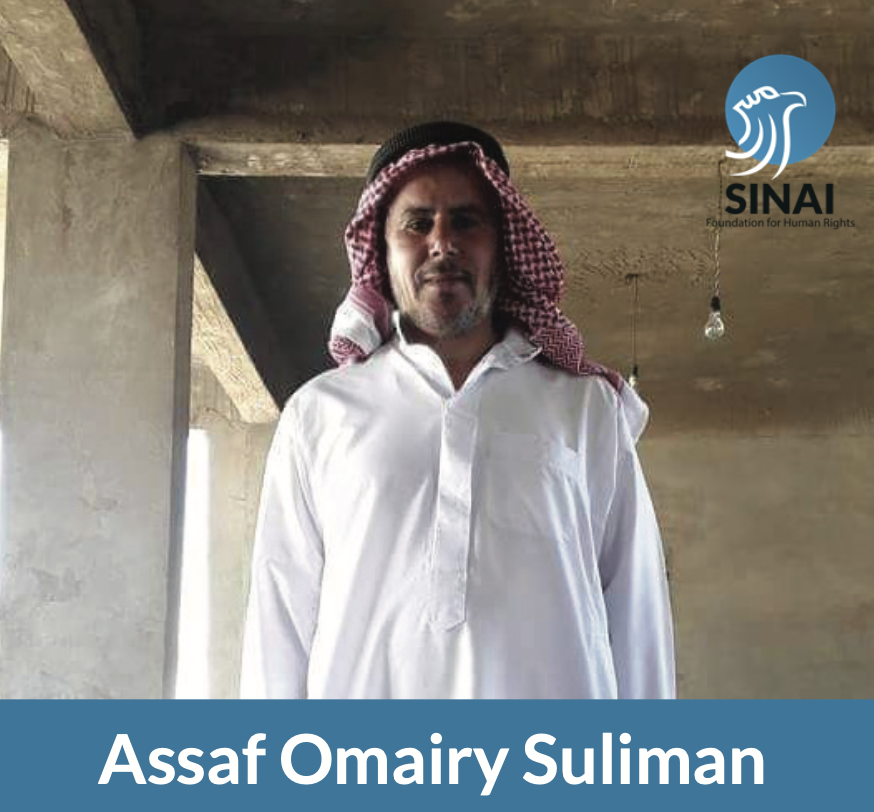
This incident is identical to what happened during the return of civilians displaced from the villages of al-Ganayen, Qatia, Iqtiya, and al-Marih, where explosive devices planted by ISIS led to the death and injury of a number of civilians in incidents reported by the Sinai Foundation and published about in previous statements and reports.
A local citizen said in his statement: “The explosion happened in a chicken coop. Assaf, the deceased, and the others who were injured saw the landmine and contacted the military to come and defuse it. Before the military force arrived, Assaf tried to take a photo of the landmine with his cellphone, but he stepped on another landmine when he was taking the photo of the first. The landmine exploded and the roof of the coop fell on them. The ambulance got there after around 50 minutes. We followed them to the hospital in our car, and the victims’ families caught up with us at Bir al-Abd hospital. The victims’ families were furious that the military didn’t sweep Tofaha for landmines, letting our people die, like the people of Qatia and Iqtiya. There were some clashes with the people and military soldiers, then the soldiers fired shots in the air to break the people up.”
In a similar incident that took place in Rafah on 09.01.2021, citizen Ahmed Salih Salama Abou-Riash, 28, was lightly injured by the explosion of an explosive device while he was driving a drinking-water tanker truck.
3.Extrajudicial murders in North Sinai
Extrajudicial murder is a gross violation of Human Rights that is recurring in Sinai, and it is an inherent practice by ISIS. Arbitrary deprivation of the right to life is a violation of article 3 of the Universal Declaration of Human Rights, and article 6 of The International Covenant on Civil and Political Rights. The African Charter on Human Rights also stated in article 4 that civilians’ right to life is to be safeguarded at all times, including during conflict, while the African Commission on Human Rights considered it to be a pillar of all rights that is non-derogable.
On 09.01.2021, ISIS revealed the murder of two civilians by gunfire through a video recording broadcasted by its media platforms, claiming that they were in cooperation with the security forces. The video, which were most likely taken under pressure and through torture, contained the victims’ confessions to cooperating with Egyptian security officers.
The murder victims are:
-
Mahir Hussein Lafy Al-Samaana.
-
Suliman Shalash Khaled Oraby.
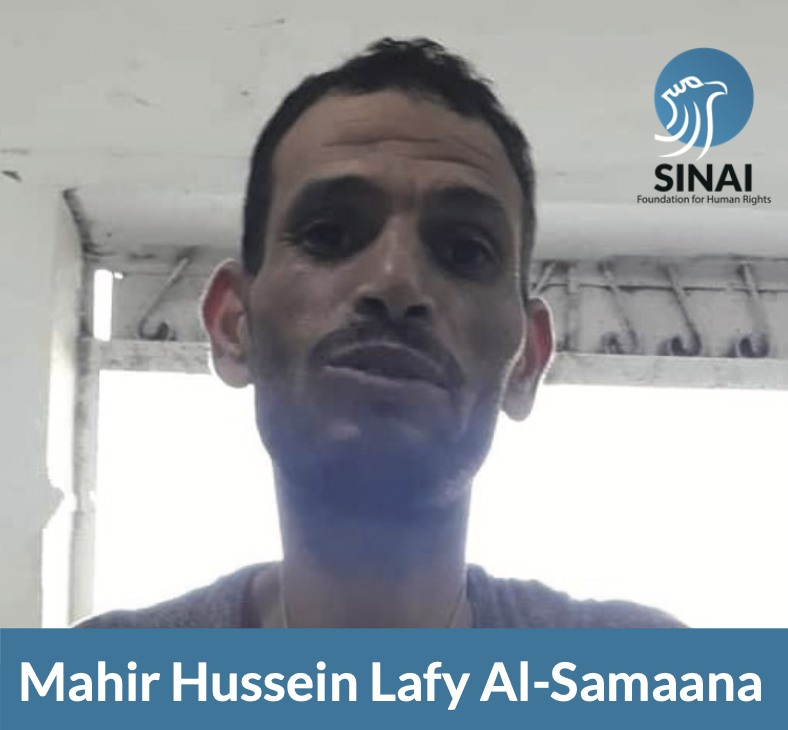
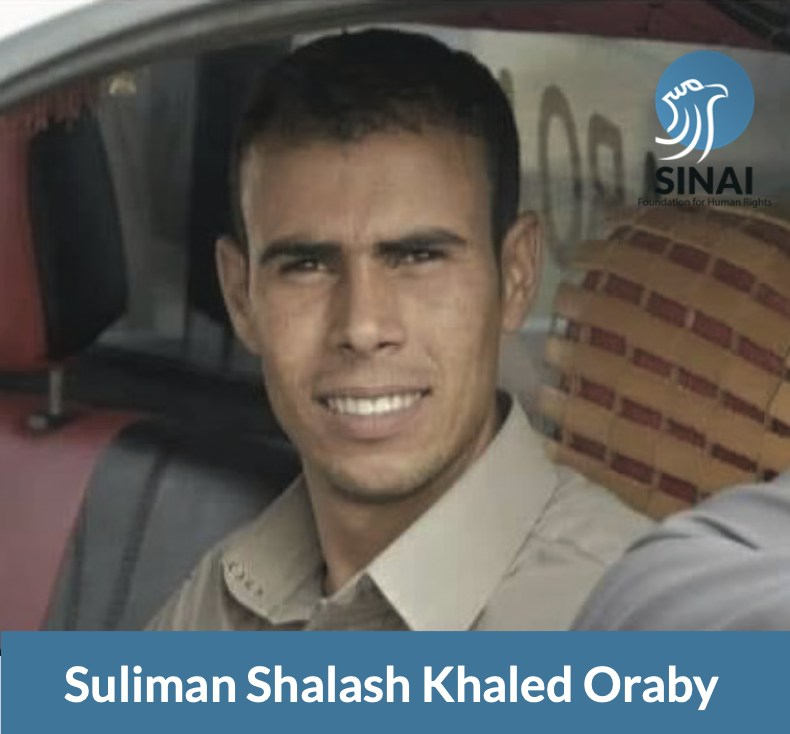
4.The abduction of two citizens in al-Shallaq village in al-Sheikh Zwayed
Civilian abductions and enforced disappearances are a pervasive problem is Sinai. ISIS group is used to abducting civilians and keeping them for long periods of time as part of a strategy they follow with the aim of asserting their dominance and punishing anyone they deem as supporters of the Egyptian authorities. The International Humanitarian Law prohibits strategized abductions and enforced disappearances. The United Nations declaration on enforced disappearances, unanimously approved, states that enforced disappearances are a violation of a range of rights, including the right to recognition as a person before the law, the right to liberty and personal security, the right not to be tortured or treated or punished in an inhuman or degrading way, and also states that they violate the right to life, or pose a serious threat to it. The International Criminal Court also considers it to be “a crime against humanity”.
On 10.01.2021, two citizens were abducted by Sinai Province group members in the village of al-Shallaq in al-Sheikh Zwayed, northern Sinai. Members of the group snuck into the area between the border patrol ambush and the Isaaf ambush dawn of Tuesday and abducted the following citizens:
-
Mohamed Salama Masoud Abou-Kharqa, 45
-
Masoud Ahmed Hassan Masoud Abou-Kharqa, 37
Simultaneous to the abduction, members of the group stole 5 sheep and a donkey, then led them to an unknown destination south the international road connecting al-Arish and al-Sheikh Zwayed without being stopped at any of the military ambushes watching the villages and the international road.
The Sinai Foundation for Human Rights met with one of the citizens of al-Shallaq, who revealed additional details about the incident and the security conditions in the village, saying:
“I swear we’re too scared to leave our houses after dark, fearing gunshots coming from the ambushes, so we all just stay at home with our children. Those who go out at night are the suspicious targets, and despite that, the soldiers only see and restrict the lives of the locals but not the takfiris. It’s impossible! Why do they only control us? ‘Where are you going? Where are you coming from? What are you carrying? From which tribe are you?’”
“There are military ambushes everywhere and in close proximity to each other, and they’re firing gunshots all day and night. But the Takfiris are able to go through the ambushes and abduct people and steal our supplies and food without anyone shooting at them. The ambushes are supposed to protect us!”
5.Explosive device killing civilians in the Rafah area
On 17.01.2021, a civilian and a child were killed by an explosive device in the Rafah area while accompanying military forces to do electrical repairs. The explosion also killed two soldiers. The two civilian victims were from Abu-Tawila village in al-Sheikh Zwayed, and they are:
-
Nidal Fawzy Mohamed Hussein, 36.
-
Mohamed Nidal Fawzy Mohamed, 9.
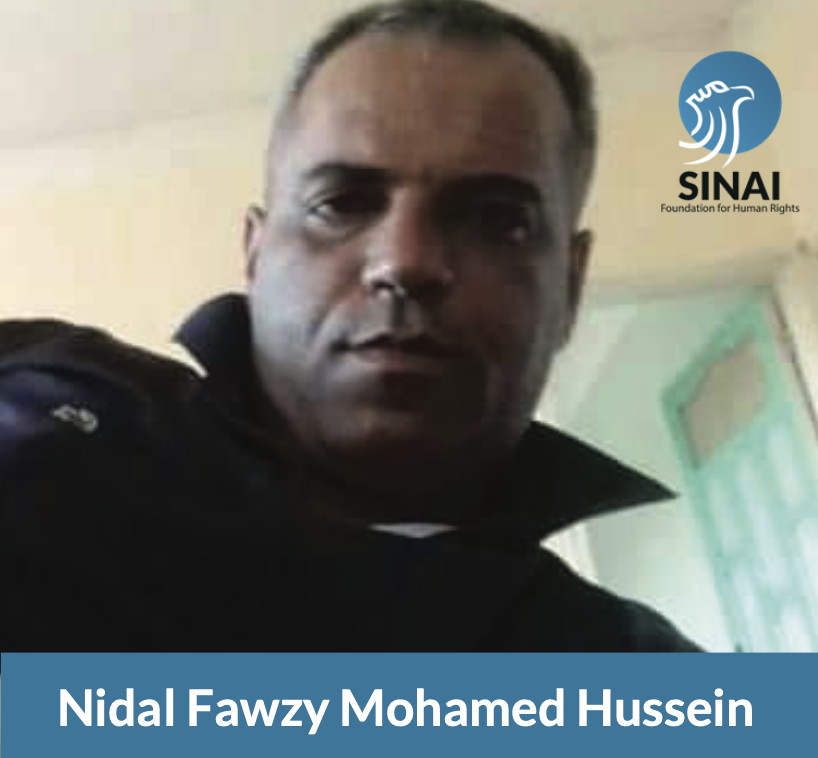
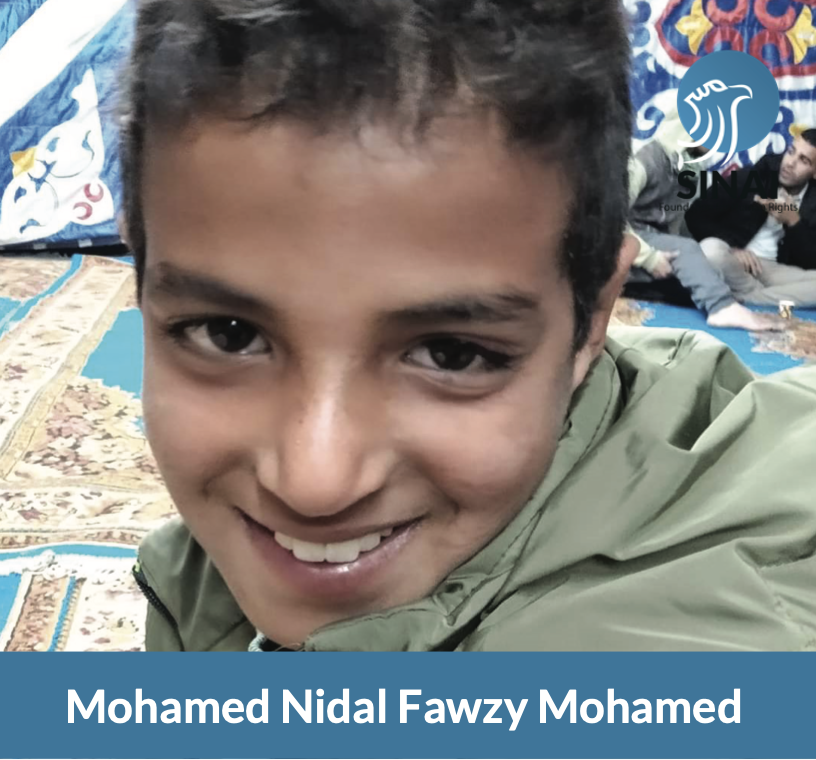
The Sinai Foundation for Human Rights met with two of al-Sheikh Zwayed locals, one of whom said:
“Nidal was a hardworking young man fighting to earn a living doing electrical repairs. We learned that he went out for some electrical repair work in al-Mutala village by the military ambush and he got in the car with the officers. He did whatever jobs he could find to support his family. The military requested his service, so he took his son with him to keep him company. Nidal was a good young man, we always worried about him when he went to work outside al-Sheikh Zwayed. The military force needed his help fixing some connections by the ambush in al-Mutala. They didn’t take long. Before midday, we heard that Nidal and his son were brought to a hospital in al-Sheikh Zwayed, dead. No one saw what happened, but we learned that a landmine exploded while they were on their way with the military force, and that some soldiers had also died and been injured in the explosion, but they were transferred to the military hospital in al-Arish. They then transferred Nidal and his son to al-Arish general hospital for the burial permit procedures.”
The second witness told the foundation team: “Hardships lead people to risk their lives to feed their families. There is no work available, and when we find any job, we hold on to it because there are no alternatives. There is no developmental work for him to go work in electrical maintenance, and that’s the case for all craftsmen. Plumbers, builders, and many others. Then when one of them dies, the government does nothing about it.”
This incident shows how hard living in Sinai is, and the dangers surrounding civilians because the conflicting parties do not refrain from targeting civilians and imposing restrictions on their lives. The details of the incident show that the father and son were not involved in the conflict, and they were not with the military force as part of the conflict, and that the father’s work as an electrician is a service he offered to everyone regardless of any military ties resulting from his bias toward a certain party. This means that the protection and immunity imposed by the International Humanitarian Law on civilians during conflict should apply here because he was not directly involved in hostile activities. Taking his son along also confirms that he had no intention of getting involved in the conflict, or that he already was involved, despite being with a military force at that moment.
Article 48 of the additional protocol (I) to the Geneva Conventions, 1977, underlines the necessity of differentiating between civilians and combatants, and article 51 affirms that civilians are generally protected, and are not to be attacked unless they play a direct role in hostile activities.
Recommendations:
To the Egyptian authorities
-
Conducting transparent investigations into the incidents of which members of the military and security forces were part, that led to the fall of civilian victims.
-
Lifting discriminatory and illegal restrictions off business and fishing and movement in Sinai and offering immediate and fair compensations to citizens who were harmed by said restrictions.
-
Complying with principles of the International Humanitarian Law by the military and security forces is an important basis that guarantees professionalism in performing their duties. Officers and military personnel should be taught those rules and trained to abide by them through curricula in the military academy and other training courses.
-
Inviting and accepting visitation requests from UN special procedures mandates to Sinai, and allowing them unhindered access, and guarantying the safety of those who cooperate with them from punishment.
-
Modifying laws and systems that grant unlimited authority to the security and military forces, including the state of emergency and the counterterrorism law, and implementing mechanisms that guarantee judicial and legal supervision on law-enforcement authorities.
To all conflicting parties, including Sinai Province militants:
-
Taking all possible precautions to protect civilians, according to the International Humanitarian Law, during any military land or air raids.
-
In areas where the unlawful side of the conflict is the ruling force, all necessary precautions are to be taken to protect the rights of all inhabitants without discrimination and ensure all basic needs of civilians.
Related Postes
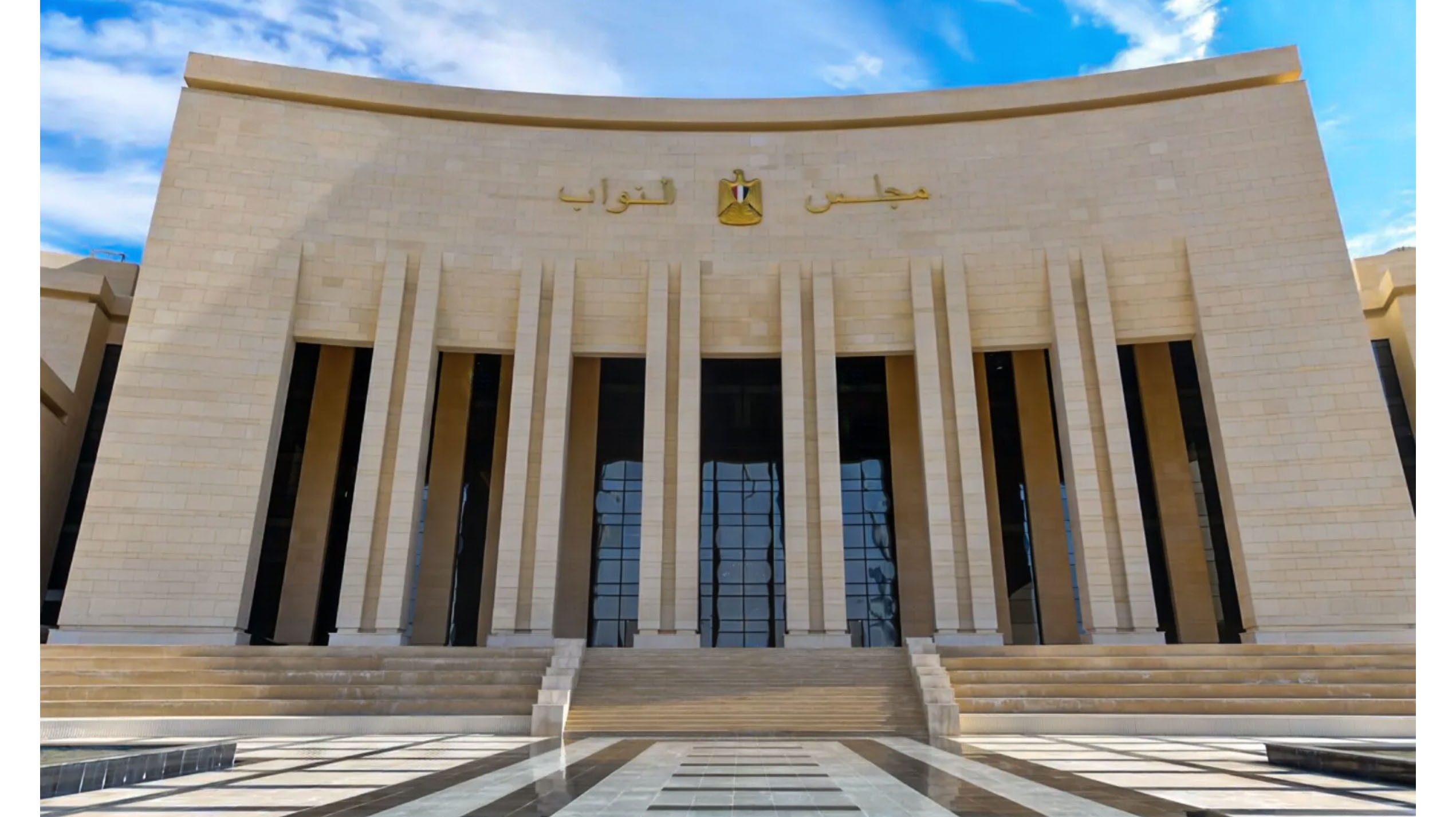 English content
English content

